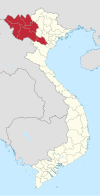Lai Châu
Appearance
You can help expand this article with text translated from the corresponding article in Vietnamese. (March 2009) Click [show] for important translation instructions.
|
Lai Châu
Thành phố Lai Châu | |
|---|---|
| Lai Châu City | |
 Lai Châu City Lake | |
 Location in northern Vietnam (tiny red mark) | |
| Coordinates: 22°23′57″N 103°26′21″E / 22.39917°N 103.43917°E | |
| Country | |
| Province | Lai Châu |
| Established town | 10 October 2004 |
| Established city | 27 December 2013 |
| Area | |
| • City (Class-3) | 70.77 km2 (27.32 sq mi) |
| Population (2003) | |
| • City (Class-3) | 52,557 |
| • Density | 743/km2 (1,920/sq mi) |
| • Urban | 40,133 |
| Time zone | UTC+7 (Indochina Time) |

Lai Châu () is the capital city of Lai Châu Province in the Northwest region of Vietnam.
History

Lai Châu, or Muang Lay (Vietnamese: Mường Lay) was the seat of lords of the White Tai who were dominant over other Tai peoples of the area, though there was rivalry between the White Tai rulers of Muang Lay and Muang So.[1] During the 1870s Muang Lay was the base of lord Đèo Văn Trị of the White Tai who sought to unite and become chief of the 12 mường (Sino-Vietnamese: Châu / 州) making up the Sip Song Chau Tai. This he partially achieved, with the help first of the Chinese Black Flags, then later the French. His authority, and the autonomy of the area, was recognised by the French in 1890.
References
- ^ Michael C. Howard, Kim Be Howard Textiles of the Daic peoples of Vietnam Page 75, 2002 "In general the White Tai nobles in the north were dominant, but even among them there was intense rivalry between the rulers of Muang Lay and Muang So. In the 1870s and 1880s Chinese bandits known as Haw (or Ho) moved into northern ..."


